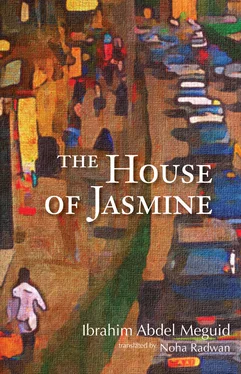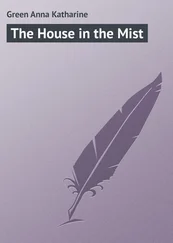“Wait!” Magid called out to her. She stopped at the door, and turned towards him.
“Yes,” she said.
“Maybe you should take him to Shatbi Hospital.”
“All right,” she said, then disappeared into the street. He returned to his seat and sat in silence for a few minutes before he said, “She doesn’t have enough money for the required medication, and the doctor has prescribed her enough medicine to kill a horse.”
So he refused to take the two pounds from her, because it seemed that this was all the money she had. I thought of the five hundred pounds, about which I never said anything to him or to Hassanayn, and felt like leaving the place immediately, but I stayed and asked him, “Have you heard from Hassanayn lately? Does he come by sometimes?”
My questions set Magid giggling for a few minutes before he finally replied, “He came by a week ago for some prescriptions. I gave them to him as a gift together with a few bottles of perfume. He’s gotten married.”
“Married?”
“Yes. And I’d like to visit him, but I can’t find the time.”
“But he never said anything.”
“He himself didn’t know it was going to happen. He found himself all alone with his mother after the last of his sisters was married, so he decided to get married as well.”
“And the apartment?”
“He’s living in his mother’s apartment.”
Magid got up to help a few customers who had walked into the pharmacy, and left me thinking about all of the stupid questions which had come out of my mouth. So Hassanayn had solved the problem in the quickest way possible. Though why should I call it a problem? I noticed a copy of Al-Ahram on the desk. The headlines were about the explosions in Iran and the upcoming return of Khomeini to Tehran. Magid returned to his seat, but it was only a minute before a young man in jeans and a leather jacket came in. He smiled at us, but looked rather uncomfortable. Magid went up to him, and the man leaned toward him and whispered something in his ear.
“Sorry. I don’t sell any of those,” Magid said. The man left with his eyes fixed on the ground.
“He was asking about psychedelic drugs,” Magid said with a shrug of his shoulders. I was surprised because the man didn’t look like the kind of person who used these drugs. Magid said that it was not a matter of looks, and that maybe he was just going to try them on the recommendation of one of his friends.
I remembered what ‘Abd al-Salam had said about Magid — that he still had a baby face, which hadn’t changed since they were in high school. The years didn’t leave their mark on Magid’s face. His hair was still as black and soft as it had always been, and he always had a big smile. We sometimes thought that if Magid walked through a sand storm, he would come out of it without a speck of dust on him. He always reminded you of a child whose mother had just cleaned and groomed him before letting him out.
“Are you making progress in German?” I asked him.
“I have quit studying German,” he answered. “I met an American woman who said that she would help me travel to the United States. I ran into her in a pharmacy in ‘Agami. She said that I shouldn’t be studying German when my English is so good, that it would be better to improve on what I already know than to start all over again with something new. She also said that she would be willing to help me join an American institute or one of the pharmaceutical companies. She’s in Cairo now. She came to Egypt with her husband, who is an investor in some projects here, and they will both leave next January. She sent me a letter from Cairo to confirm what she had told me.”
He was talking seriously and with a lot of confidence, and I wondered why he wanted to travel. I was touring the glass medicine cabinets with my eyes and wondering if there were really as many diseases in the world as all these different medicines, how many sick people there were, and if anyone was actually healthy. Or were we all living with germs and microbes which were always waiting for their chance to attack?
#
The gates of heaven opened and poured down their inevitable supply of rain. Alexandria curled up like a ball, and the days became extensions of the nights. I forgot about Hassanayn and my plans to visit him. When I left my house at six o’clock every morning, it was like going out at midnight. I walked close to the walls, trying to avoid the mud on the streets and the water pouring out of the drain pipes. I supported myself with my hand against the walls, walked so close to them that my face and chest almost touched them, and yet I nearly slipped more than once. I saw the people around me doing the same thing and it struck me that we all resembled insects.
I didn’t stop going to work. What would I do in an apartment with no electricity? I only had a few candles to light up the place. There was very little work to do, and many employees were delayed by the rains. The newspapers I read in my office said that the stormy winter had caused the port to close down, and that the ships couldn’t enter it to off-load. I wished that there were a famine. I wanted to see people eat their children after consuming all the cats and dogs in the city!
The newspapers also talked about changes in the atmosphere of the earth as a result of the nuclear experiments that were carried out openly by the powerful nations and discreetly by the smaller ones. Some scientists predicted the return of the ice age and the end of modern civilization. The television showed footage of rains in Europe, of streets and houses covered in snow, of train crashes and people freezing to death.
The employees in the shipyard said that it was the wrath of God on a nation where the men had become thieves and the women went around naked, but an employee who had just returned from Libya said that it was all because of Qaddafi, who was making the clouds rain out of season. He said that he himself had seen the airplanes fly up into the clouds and emit a chemical that dissolved the clouds over the cultivated areas of the desert. Furthermore, he added, the airplanes sometimes flew in search of clouds, which they drove in front of them like sheep to the areas that needed water, where the clouds were then dissolved into rain. He said that this process was depleting the clouds over North Africa, causing angry clouds from neighboring regions to fill the resulting vacuum. And what region is closer than Europe? He finished his story by saying that the world constantly maintains equilibrium— when a man dies in Japan, another is born in the United States.
He went from one office to another repeating his theory to the employees, and spent most of the day in the cafeteria, where the employees preferred to spend the cold days drinking hot tea. He was serious about his theory, and when the other employees laughed at him, he sought evidence and proof. He said that any high-school student knew that an area of low atmospheric pressure attracts wind, which can make the region cold or warm.
“God created the world at an equilibrium which Man alone has disturbed, and the High Dam is a prime example of that,” he added. “The dam has caused the erosion of the Egyptian coast on the Mediterranean, giving the sea the upper hand over the land. In the past, the Nile unloaded its silt into the sea, reducing the strength of the waves and the salinity of the seawater, preventing erosion. Now the sea freely beats against the coast and in less than five years, both Damietta and Rosetta will disappear from the map. The same problem will face the Nile Valley, which itself is the sedimentation of silt over millions of years. The silt came with the floods every year to counter the effects of the sand that came with the winds from the east and the west. Now the agricultural lands of the valley are being eroded, invaded by sand, and with no silt to counter its effects, it will be less than a hundred years before the Nile Valley disappears and Egypt becomes all desert again. Nature has been kind to us, but we are bastards.”
Читать дальше












